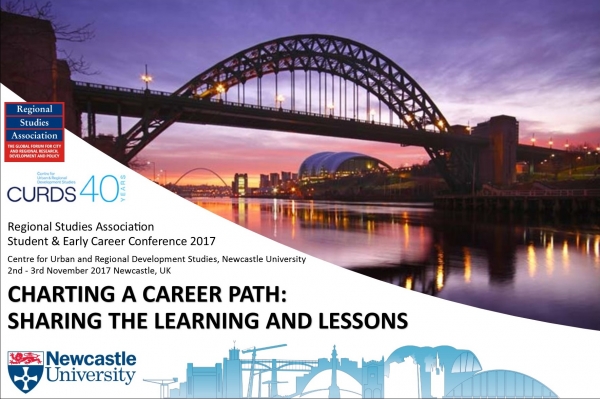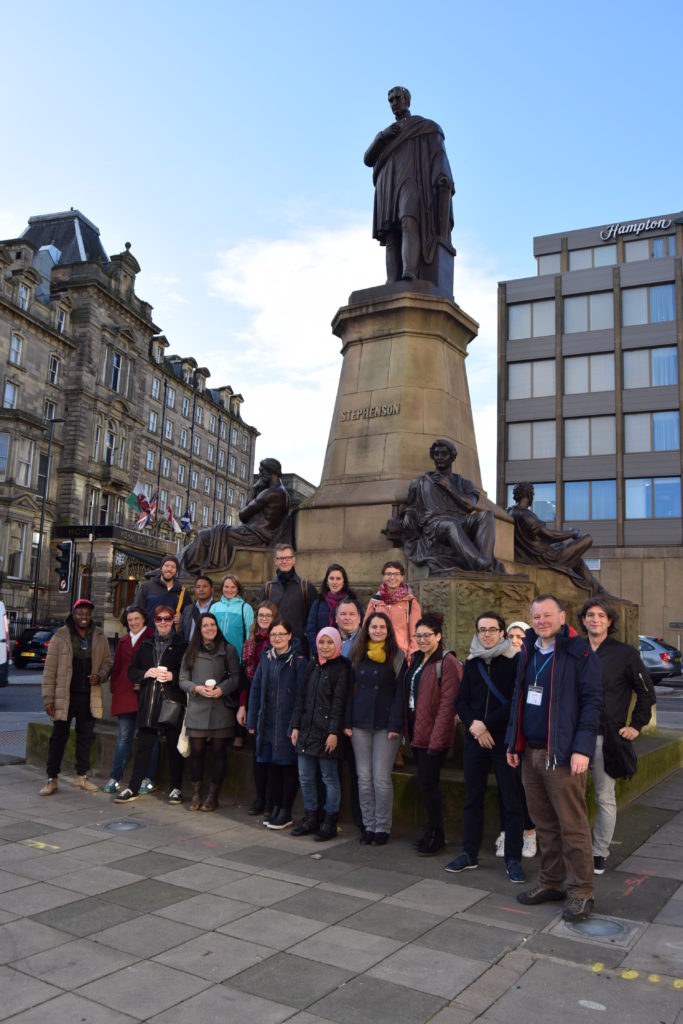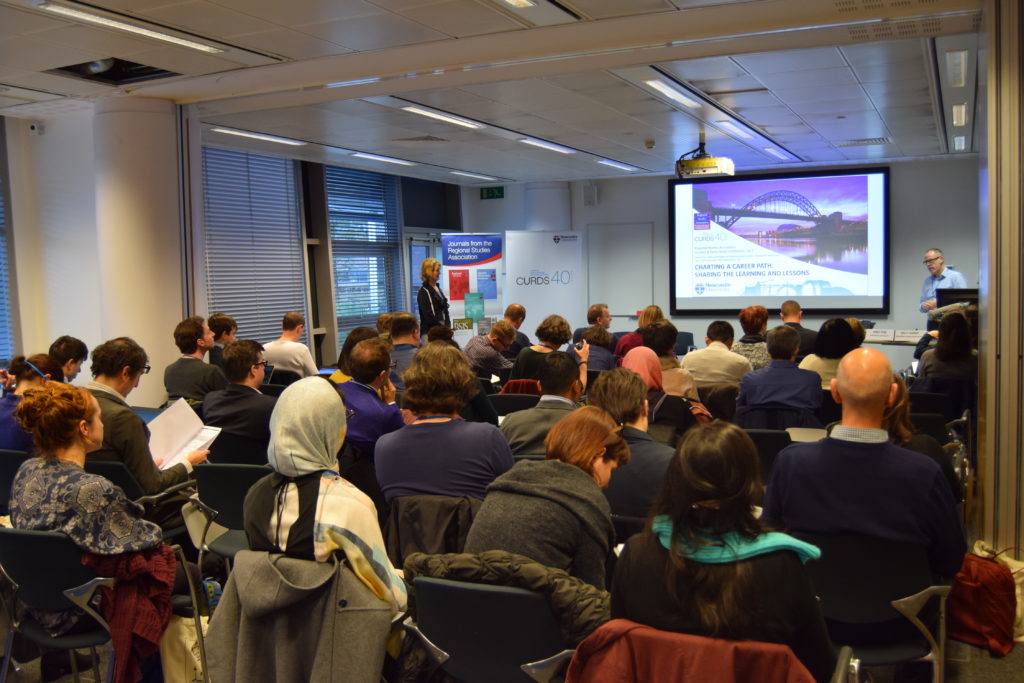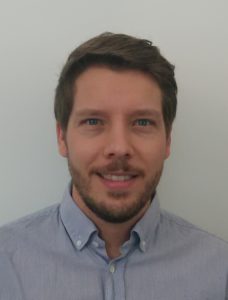Charting a Career Path: Sharing the Learning and Lessons, 2nd – 3rd November 2017, Newcastle, UK
By Jakob Sparn, Federal University of Minas Gerais (UFMG), Minas Gerais, Brazil

The RSA Early Career Conference 2017 started as a conference on regional dimensions should, by embedding the participants a little bit in the region, or rather the locality of Newcastle. This was achieved through a very well designed walking tour through some of Newcastle’s historic and modern sites guided by Mark Tewdwr-Jones, incoming chair of the Regional Studies Association, Professor of Town Planning at Newcastle University and Director of Newcastle City Futures. In my opinion, this was an excellent choice to begin the conference, both of the format and of our guide, as the tour established an informal and familiar atmosphere in which several interesting conversations and meetings took place.

This was my second RSA Conference and my first stand-alone RSA event. I became a student member at the beginning of 2017 in order to participate in the RSA Latin American Division 2nd Annual Conference held in São Paulo, Brazil in May 2017. In fact, I was part of the organization of a side-event for the Young Scholar Initiative (YSI) within the RSA Conference in São Paulo. This first encounter with the RSA and its personnel was already very pleasant and helped us to promote our own projects and research agendas. The São Paulo RSA Conference was held in the same convention centre and parallel to a huge urban planner’s conference (the XVII ENANPUR 2017). Hence, the comparatively small Early Career Conference in Newcastle was quite different and, for me personally, a much more beneficial one. It allowed for the participants to meet almost everybody at the conference, to have personal contact with all the organizers and senior speakers and for three nice, informal side-events.
The formal conference was opened by Prof. Andy Pike from Newcastle University and Sally Hardy, RSA Chief Executive, who welcomed everybody at Newcastle University’s Devonshire Building. The welcome was followed directly by the Opening Plenary with Prof. Jane Pollard and Dr. Stuart Dawley, both from the Geography Department of Newcastle University. Prof. Pollard gave a very interesting perspective on academic citizenship, gender and career development, talking about her own experiences as a woman in academia and presenting empirical studies on gender issues in academia. Prof. Pollard’s descriptive statistics on Newcastle University clearly showed the gender gaps in teaching and research – something she then discussed from her own experience of becoming a professor. I really liked having this talk first and later on through the conference several female colleagues I talked to praised this as well.
The second talk by Dr. Dawley focused on how to achieve a good balance between the different tasks in academic life, in particular the nexus between teaching, research and policy – meaning broadly the contact between academia and policy makers and the wider community. Dr. Dawley also talked about how he became a regional scholar at a time when regional studies were less prominent than they currently are. Both presentations were enriched with their personal experiences and interesting advice for young scholars. The professional, yet uncomplicated style of the senior speakers and organizers quickly established a very pleasant and productive atmosphere.

After refreshments the first of the parallel sessions with early career participants started. The panels’ topics included Infrastructure, Urban and Regional Planning, Urban Regeneration and Education and Universities with each panel having on average 3 presenters. The range of covered topics in the different panels was quite broad and the presentations I was able to watch were very well done. I learned, for example, about the sustainability of green belt projects in the Basque Country, community waste management in South Africa and the public transport system in Dublin.
This first round of panels was followed by a coffee break which allowed for further discussion and networking. Then another round of parallel panels with more on Infrastructure and Urban and Regional Planning, but also two panels on Local and Regional Development and Food, Spatial Development and Policy. I was positively surprised about the continuously high quality of the PhD and early career presenters’ work, something that might have to do with the format of the conference attracting scholars at the end of the PhD and beyond. The first day was concluded with a conference dinner at a downtown restaurant.
The second day started with another round of parallel session. The session I personally presented in was really productive for me. Not only did I have two other great presenters in the room, whose topics had several intersections with my own, but we also had a full room with an audience that provided useful suggestions and critique. Thus there was a lively discussion during our panel that continued into the lunch break. Even though, my own presentation was rather conceptual and did not include any of my empirical results (which were too preliminary at that point) I really had a lot of good feedback and questions that helped me better understand the strengths and weaknesses of my project.
After lunch provided inside the conference venue, it was already time for the Closing Plenary and three very informative presentations from senior speakers. Dr. Al James from Newcastle University talked about the Work-Life Challenges of Doing Regional Economy as an Early Career Academic. The talk was particularly interesting because we gained several insights on publishing. Prof. Lisa de Propris spoke on another very useful topic, how to apply for large grants and public funding in the EU context. As a 3rd year PhD student I have not yet applied for any large grants, but I felt this presentation would help me to develop my future research. Finally Prof. John Harrison from Loughborough University talked about the importance of thinking big when you are constructing, defending and advertising your key research ideas.
In sum, both plenary panels were really helpful and informative for someone like me who is just starting to publish and who might be looking for a more permanent job in academia soon.
I greatly enjoyed the wide range of topics, the amazing atmosphere and the format of this early career conference which allowed for a lot of personal encounters. I would strongly recommend young scholars who are interested in regional studies to attend such a conference.
About Jakob
is currently enrolled as a PhD student at the Center for Regional Planning and Development (CEDEPLAR) at the Federal University of Minas Gerais (UFMG) in Belo Horizonte, Brazil. His research focuses on the transitions towards post-carbon and post-growth economies; in particular, the institutional obstacles or enabling factors of such a development. He is also interested in the broader debate on sustainability, alternatives to development and the decolonization processes.

jsparn@cedeplar.ufmg.br



